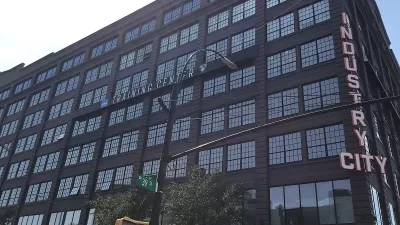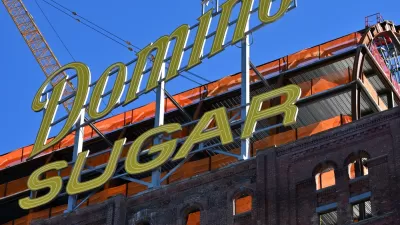A writer points to surprising statistics about Brooklyn—mainly that much of the borough is growing poorer as real estate prices fall—to make a point about how the common gentrification narrative fails cities.
According to Daniel Kay Hertz, "one problem with our obsession with gentrification as the end-all of urban equity issues is that it discourages us from talking about other important things happening in our cities."
"Case in point: Brooklyn is getting poorer."
Hertz cites a post from "data-crunching blog extraordinaire Xenocrypt," which notes that "from 1999 to 2011, median household income in Brooklyn fell from $42,852 to $42,752." After mapping median income on the neighborhoods within the borough, it's evident that a "good three-fifths" of Brooklyn is getting poorer. The same trend of stagnation stays true for real estate prices in much of Brooklyn, which are actually falling.
That the larger picture goes underreported, according to Hertz, is a failure to recognize the full urban dynamics of Brooklyn and New York City (and, for that matter, San Francisco). Says Hertz of the common, diminished journalistic and advocacy perspectives: "we’re being deprived of an accurate sense of what is actually going on in our cities…how can we claim to be working for fairer, more equitable, etc., cities, if we’re ignorant of their most basic economic and demographic changes?"
FULL STORY: More on the Limits of Anti-Gentrification Politics: Brooklyn is Getting Poorer

Planetizen Federal Action Tracker
A weekly monitor of how Trump’s orders and actions are impacting planners and planning in America.

Maui's Vacation Rental Debate Turns Ugly
Verbal attacks, misinformation campaigns and fistfights plague a high-stakes debate to convert thousands of vacation rentals into long-term housing.

Restaurant Patios Were a Pandemic Win — Why Were They so Hard to Keep?
Social distancing requirements and changes in travel patterns prompted cities to pilot new uses for street and sidewalk space. Then it got complicated.

In California Battle of Housing vs. Environment, Housing Just Won
A new state law significantly limits the power of CEQA, an environmental review law that served as a powerful tool for blocking new development.

Boulder Eliminates Parking Minimums Citywide
Officials estimate the cost of building a single underground parking space at up to $100,000.

Orange County, Florida Adopts Largest US “Sprawl Repair” Code
The ‘Orange Code’ seeks to rectify decades of sprawl-inducing, car-oriented development.
Urban Design for Planners 1: Software Tools
This six-course series explores essential urban design concepts using open source software and equips planners with the tools they need to participate fully in the urban design process.
Planning for Universal Design
Learn the tools for implementing Universal Design in planning regulations.
Heyer Gruel & Associates PA
JM Goldson LLC
Custer County Colorado
City of Camden Redevelopment Agency
City of Astoria
Transportation Research & Education Center (TREC) at Portland State University
Jefferson Parish Government
Camden Redevelopment Agency
City of Claremont





























